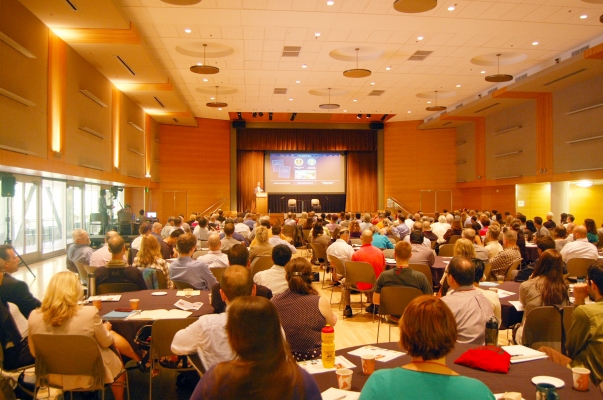Safety thread runs through sixth Oregon Transportation Summit

What is the highest number of deaths and serious injuries we should accept from our transportation system? For transportation agencies who have long sought to reduce traffic fatalities, a movement to eliminate them completely has gained currency.
This year’s Oregon Transportation Summit brings a strong safety theme, including plenary session and morning and afternoon workshops. Registration for the summit officially opens today.
Register or learn more about the summit, which takes place Monday, Sept. 15.
The 2014 Oregon Transportation Summit opens with a plenary session titled “Envisioning Vision Zero.” Vision Zero is the approach, initiated in Sweden, to not accept deaths or serious injuries as a tradeoff for other goals of the road network. In the United States, a national effort called Toward Zero Deaths grew out of these principles.
Minnesota Toward Zero Deaths has been a leader among state programs, working with partners across jurisdictions and service categories across the state to address roadway deaths and injuries. Sue Groth oversees this effort as the state traffic engineer and director of the Office of Traffic, Safety and Technology for the Minnesota Department of Transportation.
OTREC is pleased to have Groth deliver the summit’s plenary address. Groth will give context on Toward Zero Deaths and describe how this philosophy now guides her department. Alongside Minnesota, Oregon has also identified zero transportation deaths as a core objective in its strategic highway safety plan. The Oregon Department of Transportation’s Safety Division Administrator Troy Costales will follow Groth’s presentation with a response focused on Oregon’s efforts.
Biographies for Groth, Costales and other speakers are at the OTS Speaker Biographies Page.
 Because of the level of interest in the topic, this year’s plenary session will get into even finer detail: Leah Treat, director the Portland Bureau of Transportation, will offer a local response to the state-level overviews, describing how the city is working to end deaths on its streets.
Because of the level of interest in the topic, this year’s plenary session will get into even finer detail: Leah Treat, director the Portland Bureau of Transportation, will offer a local response to the state-level overviews, describing how the city is working to end deaths on its streets.
The safety theme of the opening plenary session continues with a morning workshop on strategic and system-level safety moderated by Costales and featuring Groth alongside Robert Hull of the Utah Department of Transportation and Joe Marek of Clackamas County, Oregon. An afternoon workshop offers a practical take on the same topic. Christopher Monsere of Portland State University moderates a session featuring David Hurwitz of Oregon State University, Sheila Lyons of the Oregon Department of Transportation and Marek.
As always, the Oregon Transportation Summit offers a variety of topics to appeal to transportation practitioners, policymakers, academics and students. This year’s 10 workshop topics include the benefits of public transportation, the challenges of rigid engineering standards, the latest research on transit-oriented developments, and updates to the ITE Trip Generation Manual.
Student researchers from universities represented in the NITC program will also present their work in a lively student research showcase.
 Descriptions of summit sessions are on the Oregon Transportation Summit website.
Descriptions of summit sessions are on the Oregon Transportation Summit website.
For this year’s summit, the sixth annual, we also welcome internationally renowned transit planning consultant Jarrett Walker as our keynote speaker. In his “Human Transit” book and blog, Walker explores the relationship between the technical aspects of transit planning and how decisions we make allow us to build transit systems that embody our values.
The Oregon Transportation Summit is hosted by OTREC in partnership with the Portland chapter of the Women’s Transportation Seminar, the Oregon Chapter of the American Planning Association and the Oregon Section of the Institute for Transportation Engineers. Members of those organizations and students qualify for discounted registrations.
More information is at bit.ly/OTS14.
To register, visit http://bit.ly/OTSreg.
Talking about the Oregon Transportation Summit on Twitter? Please use the #OTS2014 hashtag.
